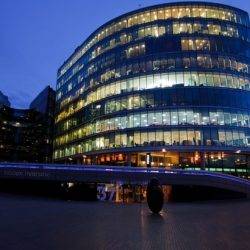May 5, 2017
Improving adult skills can help countries benefit from globalisation, claims OECD 0
 In an increasingly competitive international environment, providing workers with the right mix of skills can help ensure that globalisation translates into new jobs and productivity gains rather than negative economic and social outcomes, according to a new OECD report. The OECD Skills Outlook 2017 reveals big differences in the extent to which countries are equipping workers with the right knowledge and ability to benefit from the globalisation of production chains. The report finds a country with a skills mix that is well aligned with the requirements of technologically advanced industries can specialise in these industries on average 8 percent more than other countries, and up to 60 percent more than countries with a low alignment between the mix and these industries requirements. A supplementary note covers the UK’s situation.
In an increasingly competitive international environment, providing workers with the right mix of skills can help ensure that globalisation translates into new jobs and productivity gains rather than negative economic and social outcomes, according to a new OECD report. The OECD Skills Outlook 2017 reveals big differences in the extent to which countries are equipping workers with the right knowledge and ability to benefit from the globalisation of production chains. The report finds a country with a skills mix that is well aligned with the requirements of technologically advanced industries can specialise in these industries on average 8 percent more than other countries, and up to 60 percent more than countries with a low alignment between the mix and these industries requirements. A supplementary note covers the UK’s situation.









 As alarm grows in some circles over the impact of technology on future job prospects, a new survey suggests that Millennial’s jobs are likely to be at lower risk of automation. Research into how different generations choose jobs by jobs site Indeed compared the online search patterns of millions of UK jobseekers over the six months to March and found that younger people are substantially more likely to choose roles deemed to be at lower risk of automation. Nearly half of younger jobseekers were drawn to automation-resistant jobs, compared to fewer than four in 10 over-50s. These baby boomers are two thirds more likely than millennials to seek the manual jobs at highest risk of automation. While nearly half of millennials (48 percent) were searching for what economists term ‘non-routine’ roles, 61.1 percent of baby boomers were looking for ‘routine’ jobs. Routine jobs – which include sales, admin, transport and construction roles – are seen as being at higher risk of automation than non-routine work, which includes management, professional and service roles.
As alarm grows in some circles over the impact of technology on future job prospects, a new survey suggests that Millennial’s jobs are likely to be at lower risk of automation. Research into how different generations choose jobs by jobs site Indeed compared the online search patterns of millions of UK jobseekers over the six months to March and found that younger people are substantially more likely to choose roles deemed to be at lower risk of automation. Nearly half of younger jobseekers were drawn to automation-resistant jobs, compared to fewer than four in 10 over-50s. These baby boomers are two thirds more likely than millennials to seek the manual jobs at highest risk of automation. While nearly half of millennials (48 percent) were searching for what economists term ‘non-routine’ roles, 61.1 percent of baby boomers were looking for ‘routine’ jobs. Routine jobs – which include sales, admin, transport and construction roles – are seen as being at higher risk of automation than non-routine work, which includes management, professional and service roles.


 New guidance to help facilities managers manage the transition to agile working within their organisation has just been published by the British Institute of Facilities Management (BIFM). The Agile Working Change Management Guidance Note is aimed at FMs working at a senior and/or operational level and covers the benefits of agile working and how to successfully plan and implement an integrated approach to deliver sustainable change in working behaviour. Agile working describes a range of work settings that allow people and organisations to make new choices about when, where and how they work. It is underpinned by mobile technology and applies to people working both in and away from the traditional office, such as at home, on the road or remotely in other locations. BIFM’s research and information manager Peter Brogan said: “As an Institute, we recognise the importance of the workplace agenda for FMs and this newly commissioned Guidance Note aims to address the current lack of knowledge around some of the emerging workplace practices.”
New guidance to help facilities managers manage the transition to agile working within their organisation has just been published by the British Institute of Facilities Management (BIFM). The Agile Working Change Management Guidance Note is aimed at FMs working at a senior and/or operational level and covers the benefits of agile working and how to successfully plan and implement an integrated approach to deliver sustainable change in working behaviour. Agile working describes a range of work settings that allow people and organisations to make new choices about when, where and how they work. It is underpinned by mobile technology and applies to people working both in and away from the traditional office, such as at home, on the road or remotely in other locations. BIFM’s research and information manager Peter Brogan said: “As an Institute, we recognise the importance of the workplace agenda for FMs and this newly commissioned Guidance Note aims to address the current lack of knowledge around some of the emerging workplace practices.”


















April 7, 2017
Flexible working is not a magic bullet for workplace ills 0
by Charles Marks • Comment, Flexible working
(more…)